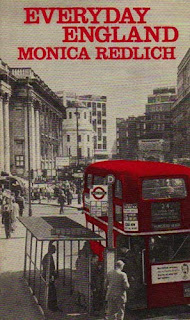Monica Redlich (1909-1963) had some success with a light-hearted book, The Young Girl’s Guide to Good Behaviour (1935), which has been reprinted several times. She was married to Sigurd Christensen, a Danish diplomat, and wrote several books about that country, and another explaining English ways and customs to overseas readers, originally those in Denmark but later for wider consumption.
This was Everyday England (1957, rev ed 1964). It is observant, affectionate but not uncritical. In fact, it is both enjoyable and useful today as a portrait of England then to England now, since the past is also, as L.P. Hartley so memorably observed, a foreign country.
She worked for a while as secretary to L.A.G. Strong, and co-edited with him Life in English Literature, an Introduction for Beginners (1932). He dedicated his novel The Seven Arms (1935) to her. As well as her non-fiction, she was also the author of a few novels with family and domestic themes. In 1970 her husband edited a fragment of autobiography by her, The Unfolding Years, together with a preface by him and a bibliography of her work.
This begins; ‘Monica Mary Redlich was born on 3 July 1909 at Boston, Lincolnshire, where her father, the Rev. Edwin Basil Redlich, was then a curate. Her mother, Maud Le Bas Le Maistre, came of a Jersey family.’ When she was fifteen he became Rector of Little Bowden, Market Harborough. She took a degree in English Literature at the University of London in 1931.
My interest in her work began when I found her now forgotten fantasy, The Various Light (1948), which I took from the shelves because I thought the title sounded promising. The epigraph shows that it is a quotation from Andrew Marvell’s ‘Thoughts in a Garden’, and refers to the soul which ‘prepared for longer flight,/Waves in its plumes the various light.’
It starts conventionally enough with a dinner party of friends and relations all with links to a village where they grew up – they are the children of the squire, the parson and the doctor, and are with their spouses or partners. The characters are carefully drawn, and we soon build a sense of their qualities and their all-too-human failings. One strand of the novel depicts their changing marital and extra-marital relationships as some of them are drawn to different partners than their current ones.
But there is another, much more unusual, strand in which most of them meet when they dream in a shared visionary world, where their roles and relationships are different. Here they move in a celestial landscape and are part of a sort of mystical college, where mentors help them to understand where they are going wrong and what they ought to do. This guidance does not necessarily bear any relation to earthly morality.
There are some qualities that resonate in both worlds, for example, music, gardens, landscape and the sea, and these provide the characters in their diurnal world with elusive echoes of their dream experiences, which they do not otherwise recall in detail. Some chapter titles indicate these: ‘The Other Music’; ‘Many-Coloured Glass’; ‘Altered Landscape’; ‘The Silver Tree’; ‘Lost City’. In this respect, the novel has some affinities with David Lindsay’s use of music and landscape to symbolise spiritual states. The combination of the novel of social relationships and of the otherworldly is similar to his approach in, for example, Sphinx (1923) and The Violet Apple (1976).
The author skilfully delays the point at which her characters find out in their everyday lives that they all dreamed, on one particular night, of very similar scenes and symbols. They then explore the shared imagery and speculate upon what it means. This takes place after a supper party, in a garden at twilight, as they each reveal what they know in turn, some enthusiastic, others diffident, some sceptical, others taken by the wonder of it. Here she achieves a delicate, beguiling quality.
The philosophy of the dream institution Monica Redlich depicts is not doctrinaire, nor is it overtly drawn from the conventional faiths as such. Some of the assumptions seem to chime with theosophical and New Age thinking, particularly the idea of astral travel, of having a spiritual form beyond the physical one, and of karma. These concepts are also found in Ronald Fraser’s mystical novels. But her work does not have the more exotic aspects of other New Age fiction, such as reincarnation or scenes from Atlantis.
I think it is quite tricky to describe a sort of celestial self-improvement centre with wise mentors and pleasant landscapes without the reader feeling a bit restless about so much sweetness and light. One could imagine Robert Aickman, with a wicked glee, satirising an earthly counterpart of just this sort of thing: indeed, I think he almost did in one or two of his stories. But, like him, and as her Everyday England book might suggest, Monica Redlich is highly observant of English middle-class social niceties and conventions, and this gives her everyday scenes composure. Depicting the supernal realm is perhaps better done through myth and symbol rather than through an institution, however benevolent.
The Various Light is a thoughtful, distinctive novel. There are not the dramatic incursions often a feature of fantastic and supernatural literature, so some readers may find the book a bit subdued. It is measured in its pace and careful in the development of its theme. Unusually, it depicts the otherworldly through human relationships, and it does so subtly. Its flawed characters are well-realised and some have an original savour. The overlapping of the unearthly into this world is handled with finesse. I think it is a book that repays our attention. Unfortunately, there are not that many copies about.
(Mark Valentine)



